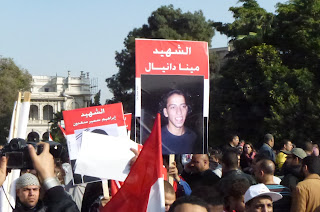Egypt’s Muslim Brotherhood president Mohamed Morsi has been in the international news nearly every day for the past week or two. First it was the positive press coverage of his cooperative role in defusing the breakout of Israeli/Hamas hostilities in Gaza. President Obama himself took calls from Morsi at 2 a.m.! What a power trip for an obscure engineer, a Muslim Brotherhood party bureaucrat who was catapulted into the limelight to pinch hit for his party’s original candidate when the latter was disqualified from the presidential elections. At the time of his election, I wrote that Egypt had a history of obscure ‘second men’ who come to power accidentally and then entrench themselves in power for surprisingly long periods. Sadat was Nasser’s yes-man vice-president till he became his own man and turned Egypt around 180 degrees from East to West; Mubarak became president unexpectedly when Sadat was assassinated, and went on to rule for thirty years.
True to historical form, the mild-mannered Morsi showed his
teeth soon after taking power. He managed to outmaneuver the Generals and force
the resignation of the Supreme Military Council that had been running the
country and pulling the strings. Today, though, the same liberals who had
applauded Morsi’s ‘coup’ against the military last summer are now flooding the
streets in outrage against his move to arrogate to himself powers even Mubarak
did not claim. Yet Morsi does not seem to have forfeited support from the
United States. What is going on?
As Sadat did before him, Morsi is now check-mating one ‘center
of power’ of the old regime after another as they challenge his newfound
authority. After having successfully foiled the Military, he is turning his
guns against the Judiciary, claiming that the Mubarak-appointed Supreme Court
that dissolved the Islamist-dominated but democratically-elected Parliament last
summer was now about to dissolve the Islamist-packed Constitutional Council
charged with drafting a new charter for the nation. In a breath-taking power
grab, Morsi put himself and the Constitutional Council above the reach of the
highest court in Egypt, in effect above the reach of the law, while he attempts
to railroad through a half-baked constitution, even after a quarter of the
Council’s members, namely liberals, women, and Copts, resigned.
In a lengthy interview in the latest issue of Time Magazine
with his face on the cover, Morsi tries to explain his actions as ‘pushing Egypt
through a bottleneck’ of crisis, in other words, till the Constitution is
ratified by referendum, after which he would retract the absolute powers he has
seized by decree. No one in Egypt, however, forgets that Mubarak ruled for
thirty years under cover of ‘emergency laws’ announced right after Sadat’s
assassination.
Much commented on in the U.S. media is a rambling reference
Morsi makes in the Time interview to the Sci-Fi kitsch classic, Planet of the
Apes. Morsi compares what is happening in Egypt today to the struggle between a
subjugated human played by Charleston Heston and his Ape masters in a
post-apocalyptic world. Regardless of the intended meaning behind the confused
analogy, it is a clever piece of public relations. It is Morsi attempting to
bridge the gap with the American public, to remind them that this bearded,
bespectacled, card-carrying member of the Muslim Brotherhood is also a U.S.
educated engineer who received his degree from the University of Southern
California, lived and worked in the States, fathered a couple of U.S.-born
children, and apparently watched his fair share of cult classic movies. By
sharing a reference to the ‘Planet of the Apes’, he clearly hopes to score a
point on relatability.
Are the Obama administration and the U.S. media buying this?
Why is criticism of Morsi’s overreach so muted? Is it that he was
democratically elected, by all accounts? Or that his role in brokering the
Israeli-Hamas truce has earned him residual good will? Or is there a darker
scenario at play?
In Egypt, of course, conspiracy theories rule. The Sinai
hypothesis, if you can call it that, has been floating around since summer, but
now it is no longer being dismissed as preposterous. According to the
conspiracy theory, there are secret negotiations to cede territory from the Sinai,
Egyptian territory, as part of a U.S.-sponsored master-plan resolution to the Israeli/Palestinian
conflict.
The Egyptian press, still largely dominated by anti-Islamist
Nasserists or liberals, is mute or muzzled when it comes to this particularly
treacherous scenario. Several editors, journalists and television personalities
have seen their careers ended abruptly in recent weeks. One television chat
show host closed her final episode days ago with a lamentation over the death
of democracy, holding her own funeral shroud up in her arms.
Forget the Planet of the Apes. Watch the Sinai.



















